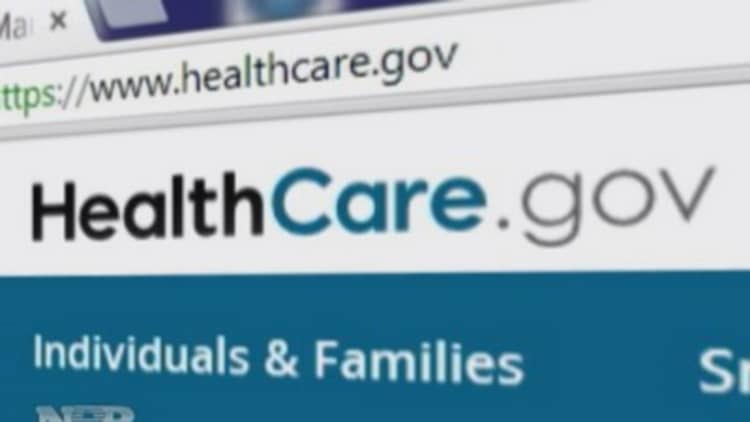
After a notoriously bad start, the Obama administration is looking for a strong finish to Obamacare open enrollment on Monday. The federal HealthCare.gov marketplace now works well for the 36 states it serves. But problems persist in about half of the states that built their own exchanges.
"As you start to look across the 14 states ... certainly you have some states that get an 'F' grade, some that are in the 'D' category," said Rick Howard, a research director at Gartner who specializes in government IT.
Among those states that did not make the grade: Hawaii, Massachusetts and Vermont. They were three of four states that chose CGI to build their exchanges—the same contractor blamed for problems with HealthCare.gov. All three experienced many of the same problems as the federal exchange, including missed deadlines and faulty software that resulted in poorly functioning websites.
Massachusetts' Health Connector officials fired CGI last week, after delaying payments on its $69 million contract with the firm. Vermont's Health Connect has also withheld payments. In Hawaii, officials are calling for an investigation into the $200 million in federal grants spent in developing the exchange and enrollment programs.
CGI has said it "worked tirelessly to deliver."
"CGI has obviously had big public missteps in a lot of very prominent ways, so you have to attribute some blame to them," said Caroline Pearson, vice president of health-care reform at Avalere Health. But she points out that in Colorado, early glitches with CGI's system were resolved much in the way they were with the federal exchange. She said the states' oversight and management of these projects was another big part of the problem.
Read MoreObamacare wants eHealth's secret: Young customers
"It's not clear that building sophisticated, consumer-friendly websites is the core competency of state government," Pearson said.
In Maryland, officials said the contractor they hired to build the state's exchange misrepresented its ability to deliver a functioning site on time. The state opted to replace North Dakota-based Noridian with a bigger health care IT firm—Optum/QSSI, the IT services division of UnitedHealth Group—which was also engaged to oversee the overhaul of HealthCare.gov. Noridian has stood by its record.
Big Tech Firms Stumbled
Yet even for big-name tech firms, building out a consumer health exchange that could connect a new federal data system with older state infrastructure involved a steep learning curve.
Xerox has come under fire for its botched system in Nevada, which resulted in long wait times and mistakes in customer billing and coverage notifications.
Xerox CEO Ursula Burns told CNBC she's grateful that the state has decided to continue to work with her firm. Looking back, she said the company didn't have enough time to develop such an extensive system.
Read MoreEmployer health plan in 2025? Don't count on it
"Having a disciplined engineering development and rollout is what is needed in these exchanges," Burns said. "We're sticking with it and actually making progress with it."
"It's kind of like getting a person to the moon—you don't do it fast, you do it right," she said. "And in exchanges, that's what we learned. You have to do it right."
Nothing seemed to go right in Oregon. Federal and state investigators are trying to figure out why the state's Cover Oregon marketplace built by database giant Oracle was never able to enroll people online, after more than $240 million in federal grants to develop the exchange and enrollment services. Analysts say like CGI, Oracle had never built a system end to end, and didn't have enough time to test it properly. The company declined to comment to CNBC.
"Oracle Policy Automation rules engines are used in numerous successful exchanges. But to have the entire framework applied ... had not really been proven out," said Gartner's Howard.
The Exchange Winners
California's health exchange, built by Accenture saw some hiccups early on, but it worked fairly smoothly after the first few weeks, helping the state enroll more than a million residents for insurance coverage, exceeding its own expectations. Analysts credit Accenture's success to disciplined project management.
"They kept the project tightly scoped and they leveraged a lot of the tech infrastructure they already had in place," said Howard. "They knew what they could hit, and by and large they did."
Read MoreAnother Obamacare test: Keeping co-ops afloat
Like Accenture, Deloitte Consulting brought its management skills to bear in creating Obamacare exchanges that worked fairly smoothly in Washington, Kentucky, Rhode Island and Connecticut.
Kevin Counihan, CEO of Connecticut's Access Health exchange, said the key to success was that his team worked closely with Deloitte to set parameters for what was achievable under a very tight deadline.

"We were building a Cadillac, and we decided that we needed a Ford Focus," he said. "We scaled back about 30 percent of what we originally wanted. And coming out of that was a much more focused type of workflow."
The two consulting firms are now being put to the test repairing some of their rivals' botched exchanges. Nevada has tapped Deloitte to oversee the overhaul of its exchange for next year, while the Obama administration hired Accenture to implement the next phase of HealthCare.gov.
With open enrollment for 2015 starting on Nov. 15, states like Oregon and Hawaii will soon have to decide whether to hire new vendors to fix their troubled exchanges—after investing hundreds of millions in federal grant money—or scrap what they have and start fresh.
"If you bring in the right vendors and bring the resources, seven months is enough time to get a website to work," said Avelere's Pearson.
This time they have plenty of proven options, whether it's adopting another state's model or turning to the federal exchange.
"It's not out of the realm of possibility that a few of these troubled states could flip back over to rely on HealhCare.gov for operations," she said.


